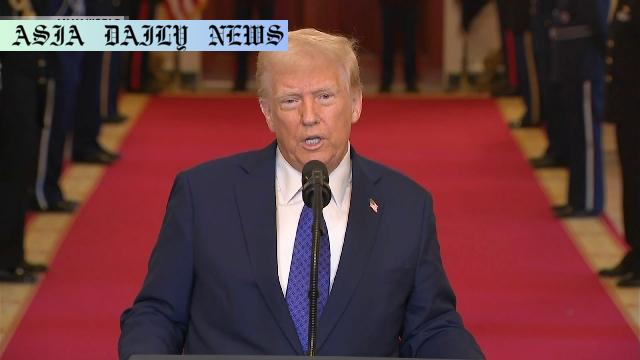Trump advocates for Russia’s readmission to the G7, stating it might have prevented issues with Ukraine and emphasizes diplomacy.
US President Donald Trump reiterated his stance on Russia’s readmission to the G7.
He attributed the exclusion of Russia to past US leadership, citing Obama and Biden.
Trump emphasized that Russia’s inclusion might have prevented Ukraine’s crisis.

Introduction: A Controversial Perspective
Former US President Donald Trump has once again voiced his controversial opinion regarding the readmission of Russia to the Group of Seven (G7). Speaking at the White House, he reiterated his belief that Russia’s exclusion from the prominent industrialized nations’ summit was a mistake. Trump contends that including Russia in the G7 could have potentially averted some of the geopolitical challenges currently faced by Ukraine and beyond.
The Historical Context: Russia’s Expulsion
In 2014, the Group of Eight (G8) excluded Russia after its annexation of Crimea, an event that drew widespread condemnation from Western nations. This decision marked a significant shift in the international political landscape and was heavily influenced by the leadership of then-US President Barack Obama. The expulsion was seen as a punitive measure that isolated Russia from the global economic and diplomatic stage.
Trump’s Criticism of Past Leadership
Donald Trump has not held back in criticizing his predecessors, Barack Obama and Joe Biden, for their roles in the decision to exclude Russia. Trump argues that the exclusion exacerbated tensions with Russia and undermined diplomatic avenues that may have otherwise prevented conflicts like the ongoing Ukraine war. He firmly believes that if he had been in office at the time, the geopolitical dynamics in Eastern Europe would be markedly different.
A Renewed Call for Diplomatic Engagement
During his first term as President from 2017 to 2021, Trump repeatedly called for Russia’s reintegration into the G7. He has continued to champion this view, arguing that effective diplomacy and engagement with Russia are vital for global stability. Trump’s comments highlight his willingness to work towards resolving the ongoing conflict between Russia and Ukraine, which began with Russia’s invasion in 2022.
The Implications of Including Russia
Trump’s stance has reignited debates among world leaders and policymakers regarding the potential benefits and risks of readmitting Russia into the G7. Supporters of this view argue that bringing Russia back to the table would foster dialogue, reduce hostilities, and create an avenue for mutually beneficial agreements. Critics, however, contend that such a move would undermine the principles of international law and reward aggression, particularly given Russia’s annexation of Crimea and its ongoing military activities in Ukraine.
The Broader Global Impact
Trump’s proposal also reflects a broader shift in how global power dynamics are perceived. The inclusion or exclusion of nations such as Russia from key international forums like the G7 can have profound implications, not only for the countries directly involved but also for global trade, security, and diplomacy. The G7’s decisions often set the tone for broader international relations, making this debate all the more significant.
Conclusion: A Divisive Debate
Donald Trump’s call for Russia’s readmission to the G7 underscores his belief in the power of diplomacy and engagement over isolation. While his views are undoubtedly polarizing, they bring to the forefront critical questions about how the international community should address complex geopolitical challenges. As the world continues to grapple with the consequences of Russia’s actions and the Ukraine crisis, the debate over its role in global governance is far from over.
Commentary
A Compelling Yet Polarizing Stand
Donald Trump’s call for Russia’s readmission to the G7 raises interesting yet divisive questions about diplomacy, geopolitics, and international stability. While his viewpoint is grounded in the belief that dialogue and engagement are preferable to exclusion, it unearths deep-seated disagreements among policymakers on the global stage. The proposal certainly has its merits, particularly in terms of fostering discussions that aim to resolve long-standing conflict.
Examining Diplomatic Challenges
One cannot ignore the complexities associated with decisions of this scale. Including Russia in the G7 would undoubtedly be a controversial decision, laden with potential risks and opportunities. While advocates suggest it could lead to a de-escalation of existing tensions, critics fear it may embolden aggressive behavior by setting a dangerous precedent. These contrasting perspectives ensure the conversation surrounding Russia’s inclusion remains nuanced and vital.
The Need for Strategic Engagement
At its core, Trump’s argument hinges on the importance of strategic alliances and diplomatic engagement. Whether one agrees with his methods or not, his perspective highlights the necessity of finding pathways to coexistence and collaboration on the global stage. In the face of escalating global crises, creative approaches to diplomacy could hold the key to long-term solutions.
Final Reflection
Ultimately, Donald Trump’s take on Russia’s place within the G7 reignites debates that have long shaped the contours of modern geopolitics. While his comments may spark criticism, they also provoke necessary conversations about the effectiveness of global governance structures. It remains up to policymakers to weigh the pros and cons of such actions, keeping in view both historical lessons and contemporary realities.


